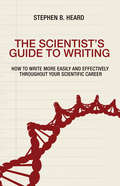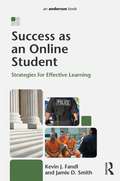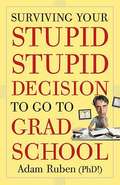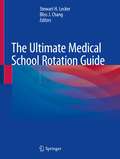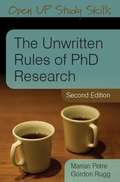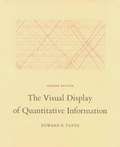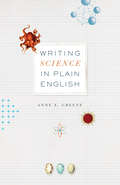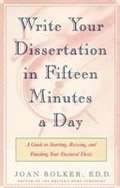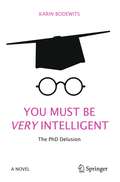Special Collections
Transitioning to Grad School
Description: Are you or is someone you know making the major transition to graduate school? These titles will help make that leap a little bit easier! #gradschool #backtoschool #graduateschool
- Table View
- List View
The Scientist's Guide to Writing
by Stephen B. HeardThe ability to write clearly is critical to any scientific career. The Scientist's Guide to Writing provides practical advice to help scientists become more effective writers so that their ideas have the greatest possible impact.Drawing on his own experience as a scientist, graduate adviser, and editor, Stephen Heard emphasizes that the goal of all scientific writing should be absolute clarity; that good writing takes deliberate practice; and that what many scientists need are not long lists of prescriptive rules but rather direct engagement with their behaviors and attitudes when they write. He combines advice on such topics as how to generate and maintain writing momentum with practical tips on structuring a scientific paper, revising a first draft, handling citations, responding to peer reviews, managing coauthorships, and more.In an accessible, informal tone, The Scientist's Guide to Writing explains essential techniques that students, postdoctoral researchers, and early-career scientists need to write more clearly, efficiently, and easily.Emphasizes writing as a process, not just a productEncourages habits that improve motivation and productivityExplains the structure of the scientific paper and the function of each partProvides detailed guidance on submission, review, revision, and publicationAddresses issues related to coauthorship, English as a second language, and more
Students with Learning Disabilities at Graduate and Professional School
by Stanley J. AntonoffThis comprehensive text examines strategies to help students with learning and attentional disabilities get the most out of their graduate school experience.
Success as an Online Student
by Kevin J. Fandl and Jamie D. SmithThis book presents concise guidance to make the online learning journey enjoyable, productive, and most of all, worthwhile.
Surviving Your Stupid, Stupid Decision to Go to Grad School
by Adam RubenA hilarious and irreverent guide for grad students across the country, this work includes essays, lists, and illustrations all dedicated to poking fun at the graduate school experience. bw illustrations throughout.
The Ultimate Medical School Rotation Guide
by Stewart H. Lecker and Bliss J. ChangWritten by the top medical student rotators, this book provides medical students with the often elusive information and skills required to ace their clinical rotationsChapters cover all major medical sub-specialties such as internal medicine, general surgery, cardiology, dermatology, orthopedics, neurosurgery, and ophthalmology. Additionally, the book offers many novel features including a review of core rotation skills for oral presentations and a walk-through of a day in the life of the medical student on a particular rotation. It focuses on the common cases that students actually encounter in the hospital. This format thereby administers a complete, concise overview of what is needed for each rotationA unique resource, The Ultimate Medical School Rotation Guide is not only instructional and comprehensive, but also assuring and supportive as it encourages students to appreciate this rewarding time in their medical careers
The Unwritten Rules of PhD Research (Second Edition)
by Marian Petre and Gordon RuggThis book on the process of PhD research, provides readers with engaging discussion and comprehensive guidance on aspects covering all the key topics of the previous edition, including what a PhD is really about, how to do one well, how to decipher what your supervisor actually means by terms like 'good referencing' and 'clean research question' and how to design, report and defend your research, the authors continue to offer an accessible, down-to-earth, and insightful account of the whole PhD process..
The Visual Display of Quantitative Information
by Edward TufteThe classic book on statistical graphics, charts, tables. Theory and practice in the design of data graphics, 250 illustrations of the best (and a few of the worst) statistical graphics, with detailed analysis of how to display data for precise, effective, quick analysis. Design of the high-resolution displays, small multiples. Editing and improving graphics. The data-ink ratio. Time-series, relational graphics, data maps, multivariate designs. Detection of graphical deception: design variation vs. data variation. Sources of deception. Aesthetics and data graphical displays. This is the second edition of The Visual Display of Quantitative Information. Recently published, this new edition provides excellent color reproductions of the many graphics of William Playfair, adds color to other images, and includes all the changes and corrections accumulated during 17 printings of the first edition.
Writing Science
by Joshua SchimelAs a scientist, you are a professional writer: your career is built on successful proposals and papers. Success isn't defined by getting papers into print, but by getting them into the reader's consciousness. Writing Science is built upon the idea that successful science writing tells a story. It uses that insight to discuss how to write more effectively. Integrating lessons from other genres of writing with those from the author's years of experience as author, reviewer, and editor, the book shows scientists and students how to present their research in a way that is clear and that will maximize reader comprehension. The book takes an integrated approach, using the principles of story structure to discuss every aspect of successful science writing, from the overall structure of a paper or proposal to individual sections, paragraphs, sentences, and words. It begins by building core arguments, analyzing why some stories are engaging and memorable while others are quickly forgotten, and proceeds to the elements of story structure, showing how the structures scientists and researchers use in papers and proposals fit into classical models. The book targets the internal structure of a paper, explaining how to write clear and professional sections, paragraphs, and sentences in a way that is clear and compelling. The ideas within a paper should flow seamlessly, drawing readers along. The final section of the book deals with special challenges, such as how to discuss research limitations and how to write for the public.
Writing Science in Plain English
by Anne E. GreeneScientific writing is often dry, wordy, and difficult to understand. But, as Anne E. Greene shows in Writing Science in Plain English,writers from all scientific disciplines can learn to produce clear, concise prose by mastering just a few simple principles. This short, focused guide presents a dozen such principles based on what readers need in order to understand complex information, including concrete subjects, strong verbs, consistent terms, and organized paragraphs. The author, a biologist and an experienced teacher of scientific writing, illustrates each principle with real-life examples of both good and bad writing and shows how to revise bad writing to make it clearer and more concise. She ends each chapter with practice exercises so that readers can come away with new writing skills after just one sitting. Writing Science in Plain English can help writers at all levels of their academic and professional careers--undergraduate students working on research reports, established scientists writing articles and grant proposals, or agency employees working to follow the Plain Writing Act. This essential resource is the perfect companion for all who seek to write science effectively.
Writing Your Dissertation in Fifteen Minutes a Day
by Joan BolkerUsing positive reinforcement, she begins by reminding thesis writers that being able to devote themselves to a project that truly interests them can be a pleasurable adventure. She encourages them to pay close attention to their writing method in order to discover their individual work strategies that promote productivity; to stop feeling fearful that they may disappoint their advisors or family members; and to tailor their theses to their own writing style and personality needs.
You Must Be Very Intelligent
by Karin BodewitsYou Must be Very Intelligent is the author's account of studying for a PhD in a modern, successful university. Part-memoir and part-expos#65533;, this book is highly entertaining and unusually revealing about the dubious morality and desperate behaviour which underpins competition in twenty-first century academia. This witty, warts-and-all account of Bodewits#65533; years as a PhD student in the august University of Edinburgh is full of success and failure, passion and pathos, insight, farce and warm-hearted disillusionment. She describes a world of collaboration and backstabbing; nefarious financing and wasted genius; cosmopolitan dreamers and discoveries that might just change the world. . . Is this a smart people's world or a drip can of weird species? Modern academia is certainly darker and stranger than one might suspect. . . This book will put a wry, knowing smile on the faces of former researchers. And it is a cautionary parable for innocents who still believe that lofty academia is erected upon moral high ground. . .
